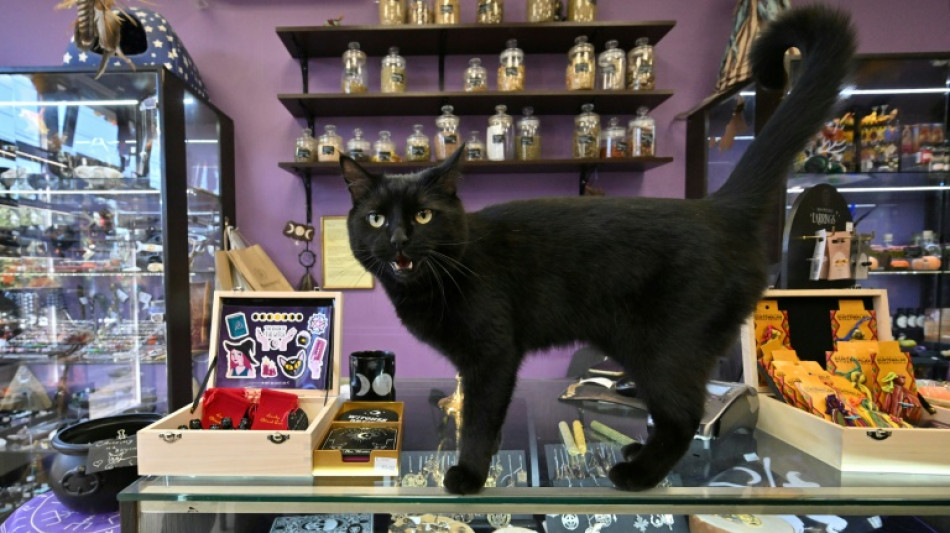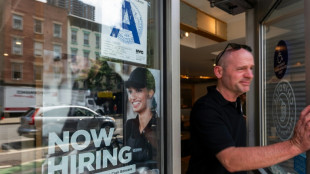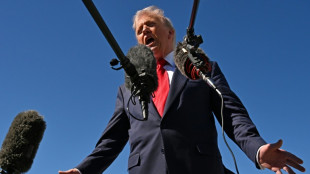
-
 Wall Street stocks steady after positive jobs data
Wall Street stocks steady after positive jobs data
-
Trump blasts Democrats as government shutdown becomes longest ever

-
 Indian pilgrims find 'warm welcome' in Pakistan despite tensions
Indian pilgrims find 'warm welcome' in Pakistan despite tensions
-
Inter and AC Milan complete purchase of San Siro

-
 Swedish authorities inspect worksite conditions at steel startup Stegra
Swedish authorities inspect worksite conditions at steel startup Stegra
-
Keys withdraws from WTA Finals with illness

-
 Prince Harry says proud to be British despite new life in US
Prince Harry says proud to be British despite new life in US
-
EU strikes last-ditch deal on climate targets as COP30 looms

-
 Stocks retreat as tech bubble fears grow
Stocks retreat as tech bubble fears grow
-
Shein opens first permanent store amid heavy police presence

-
 West Indies edge New Zealand despite Santner brilliance
West Indies edge New Zealand despite Santner brilliance
-
French pair released by Iran await return home

-
 German factory orders up but outlook still muted
German factory orders up but outlook still muted
-
Death toll tops 100 as Philippines digs out after typhoon

-
 Attack on key city in Sudan's Kordofan region kills 40: UN
Attack on key city in Sudan's Kordofan region kills 40: UN
-
'No one could stop it': Sudanese describe mass rapes while fleeing El-Fasher

-
 Champagne and cheers across New York as Mamdani soars to victory
Champagne and cheers across New York as Mamdani soars to victory
-
Medieval tower collapse adds to Italy's workplace toll

-
 BMW boosts profitability despite China, tariff woes
BMW boosts profitability despite China, tariff woes
-
South Africa's Wiese wary of 'hurt' France before re-match

-
 Beyond limits: Croatian freediver's breathtaking record
Beyond limits: Croatian freediver's breathtaking record
-
Tottenham supporting Udogie after alleged gun threat in London

-
 Thunder roll Clippers to stay unbeaten as SGA keeps streak alive
Thunder roll Clippers to stay unbeaten as SGA keeps streak alive
-
In appeal, Australian mushroom murderer alleges 'miscarriage of justice'

-
 Toyota hikes profit forecasts 'despite US tariffs'
Toyota hikes profit forecasts 'despite US tariffs'
-
Ex-France lock Willemse challenges Meafou to become 'the bully'

-
 Ukrainians to honour sporting dead by building country they 'died for': minister
Ukrainians to honour sporting dead by building country they 'died for': minister
-
At least 7 dead after UPS cargo plane crashes near Louisville airport

-
 US Supreme Court hears challenge to Trump tariff powers
US Supreme Court hears challenge to Trump tariff powers
-
US government shutdown becomes longest in history

-
 India's Modi readies bellwether poll in poorest state
India's Modi readies bellwether poll in poorest state
-
Green goals versus growth needs: India's climate scorecard

-
 Where things stand on China-US trade after Trump and Xi talk
Where things stand on China-US trade after Trump and Xi talk
-
Sri Lanka targets big fish in anti-corruption push

-
 NY elects leftist mayor on big election night for Democrats
NY elects leftist mayor on big election night for Democrats
-
Injured Jordie Barrett to miss rest of All Blacks tour

-
 Asian markets tumble as tech bubble fears grow
Asian markets tumble as tech bubble fears grow
-
Pay to protect: Brazil pitches new forest fund at COP30

-
 Iraq's social media mercenaries dying for Russia
Iraq's social media mercenaries dying for Russia
-
Young leftist Trump foe elected New York mayor

-
 Concerns at ILO over expected appointment of close Trump advisor
Concerns at ILO over expected appointment of close Trump advisor
-
Venus Williams to return to Auckland Classic at the age of 45

-
 No deal yet on EU climate targets as COP30 looms
No deal yet on EU climate targets as COP30 looms
-
Typhoon death toll climbs to 66 in the Philippines

-
 NATO tests war preparedness on eastern flank facing Russia
NATO tests war preparedness on eastern flank facing Russia
-
Uncapped opener Weatherald in Australia squad for first Ashes Test

-
 Liverpool down Real Madrid in Champions League, Bayern edge PSG
Liverpool down Real Madrid in Champions League, Bayern edge PSG
-
Van Dijk tells Liverpool to keep calm and follow Arsenal's lead

-
 PSG left to sweat on injuries to Dembele and Hakimi
PSG left to sweat on injuries to Dembele and Hakimi
-
Reddit, Kick to be included in Australia's social media ban


Sci-fi writer Charles Stross' dark take on Silicon Valley 'religion'
Twenty years ago, British sci-fi author Charles Stross plunged readers into a head-spinning tale of mind uploading, the dismantling of the solar system and inhuman artificial intelligence masquerading as a cat.
Beyond an exhilarating story, Stross' 2005 book "Accelerando" was a thought experiment with ideas like transhumanism, technological "singularity" and rationalism -- concepts that had been circulating in Silicon Valley from the late 1980s -- and which many believe still animate powerful figures like Elon Musk and Peter Thiel.
"I was basically trying to bottle up all the future shock I was living with... on the edge of a nervous breakdown from dealing with an exponential growth curve" as an overworked programmer at a dotcom-era startup, Stross told AFP.
Originally published as a series of short stories, "Accelerando" went on to win a Locus Award, one of science fiction writing's major honours.
The novel follows three generations living through a "singularity" -- a theorised moment when technological progress accelerates to a pace beyond which almost anything becomes possible.
Among Stross' inspirations was "Extropians", a pre-social-media mailing list popular among techies that hosted discussions among "some interesting and very odd people... very much into self-improving AI, the singularity, cryonics, space colonisation... they had a strong libertarian bent," he remembers.
"Extropians" would also inspire figures like Ray Kurzweil, futurist and Google "AI visionary", who Stross believes "strip-mined" the conversations there for his books predicting the singularity.
Chapters of "Accelerando" track anarchic inventor Manfred, who struggles with relatable 21st-century problems like battles over digital copyright and remembering who and where he is without his smart glasses.
Another follows his daughter Amber, who uploads her mind into a computer to set off for another star system in the memory banks of a tiny starship.
The book also features Amber's son Sirhan, who lives in a solar system largely transformed into computing hardware to support ever-more uploaded minds and AIs.
- Silicon Valley religion -
Such out-there scenarios are central to what AI researcher Timnit Gebru and intellectual historian Emile Torres have dubbed "TESCREAL" -- short for "Transhumanism, Extropianism, Singularitarianism, Cosmism, Rationalism, Effective Altruism, and Longtermism".
In a 2024 paper, they described this "bundle" as one of the "ideologies driving the race to attempt to build Artificial General Intelligence" smarter than humans -- and traced its roots back to "the Anglo-American eugenics tradition of the 20th Century".
"TESCREAL is what you get when a bunch of relatively bright, technologically-interested former Christians... reinvent religion," Stross said.
"Christianity is a template for syncretistic religions" -- belief systems "which pick and match (ideas) from all over the place and glom them together," he added.
"TESCREAL is doing exactly the same thing with a bunch of technology-related memes."
Some statements and projects of today's tech titans echo this complex of beliefs, which foresees humans evolving beyond their present form, achieving immortality -- perhaps by merging with AI -- and multiplying throughout the universe.
Elon Musk, for example, has spoken about making humans a "multiplanetary" species, was one of the original backers of OpenAI's stated mission to develop "artificial intelligence (that) benefits all of humanity" and founded Neuralink, a brain implant startup that aims to one day "expand how we experience the world".
And OpenAI boss Sam Altman mused in a 2017 blog post about when humans would "merge" with machines, a process he believed "has already started" and "is probably going to happen sooner than most people think".
- 'Escapist fiction, big ideas' -
Stross said that with the likes of Musk close to power in the Trump administration and the threat of climate change hanging over the world, he is "fleeing screaming from writing about the near future".
With "reality around us going to hell in a handbasket," he sees his aversion to the present mirrored in readers' appetite for "cosy escapist stuff".
"I'm an entertainer... although I've always tried to do entertainment by combining regular escapist fiction with some big ideas," Stross said.
Two decades later, his writing is circling back to TESCREAL as he imagines a future where its promises go unrealised.
"What if there is not a singularity but everybody believes in it?" he mused. "What if we get half-baked versions of the tech?"
His current projects include a story in which humanity's far-future descendants "have religions... based on TESCREAL, and there are holy wars over who will be allowed to set the rules in the AI upload heaven that nobody's actually built yet."
H.Kuenzler--VB



